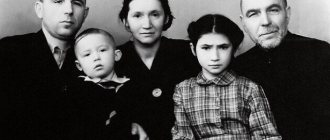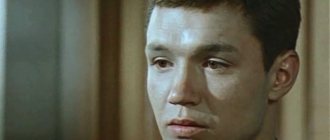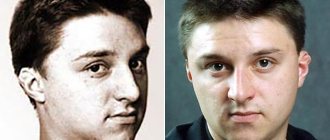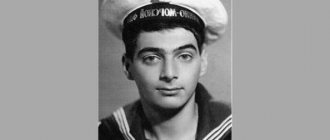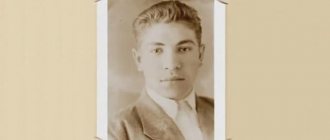Biography
Valentin Iosifovich Gaft was born in Moscow. His father, a lawyer by profession, fought in the Great Patriotic War. “Dad was an amazingly modest, but strong and proud man. This was a real man. He was a military man and went through almost the entire war,” recalls Valentin Gaft.
During his school years, Valentin participated in amateur performances, where he had to play exclusively female roles, because only boys studied at his school at that time.
In 1953, Valentin Gaft entered the Moscow Art Theater School.
Choice of profession
Although Gaft grew up in a completely non-acting family, he began to be drawn to the theater from childhood. The boy was greatly impressed by the play “Special Assignment,” which he watched in fourth grade. Valya firmly decided that he would be an actor, so he began to participate in school amateur performances.
It's hard to believe, but initially he was offered only female roles. The fact is that in those years there was separate education in Soviet schools, and boys studied separately from girls, so the roles of ladies in performances were forced to be played by the prettiest guys, which included Valya Gaft.
Theater
Since 1957, after graduating from the studio school, he worked at the Moscow Drama Theater, the Mossovet Theater, and Lenkom. At the Satire Theater in 1967, he played one of the best roles - Count Almaviva in The Marriage of Figaro in a duet with Andrei Mironov.
“My parents reacted to my artistic life in a unique way. Mom, seeing me in the Satire Theater’s play “The Marriage of Figaro,” uttered one single phrase: “Valya, but how thin you are!”
Since 1969, Valentin Gaft has been the leading artist of the Sovremennik Theater. In the theater he played many roles: Pyotr Aduev in the play “An Ordinary Story” (1970) based on Ivan Goncharov, Gusev in the production of “Valentin and Valentina” (1971) by Mikhail Roshchin, Henry IV in the play of the same name by Luigi Pirandello (1978), Louis XIV in “The Cabale of the Saint” (1981) by Mikhail Bulgakov, Vershinin in “Three Sisters” (1982) by Anton Chekhov, etc.
Among his theatrical works at Sovremennik in recent years are Gorodnichy in Nikolai Gogol’s The Government Inspector, Higgins in Bernard Shaw’s Pygmalion, Rakhlin in Vladimir Voinovich and Grigory Gorin’s The Medium Fluffy Domestic Cat, Isolde Kukin in Ak Go Away Nikolai Kolyada, Leiser in “Difficult People” by Yosef Bar-Yosef and Glumov in “Balalaikin and Co.” by Mikhail Saltykov-Shchedrin.
Valentin Iosifovich also played the main role in the play based on the play, which he himself wrote: “The Dream of Gaft, retold by Viktyuk.”
In addition, the production of “Balalaikin and Co.” became Valentin Gaft’s directorial debut in “Sovremennik”; he did this work together with Igor Kvasha and Alexander Nazarov.
In the artist’s current repertoire: He is in the play “Hare love story” by Nikolai Kolyada, Firs in “The Cherry Orchard” by A.P. Chekhov, Weller Martin in The Gin Game by Donald Leah Coburn.
Valentin Gaft also played in other theaters: in 2000, at the Teatron-N theater agency, he played the role of James in the play “The Pinter Collection”; in 2002, he played the role of Trusotsky at the Mossovet Theater in the play “Husband, Wife and Lover.”
In 2012 at the Theater named after M.N. Yermolova Gaft played Svetlovidov in the production of “The Biggest Little Drama.”
Valentin Gaft is the president of the Russian National Acting Award named after Andrei Mironov “Figaro”.
Personal life of Valentin Gaft
Valentin Gaft's first youthful love was student Dina Vasilenok, who lived in the Moscow State University dormitory.
The dorm windows overlooked the vacant lot where he played football as a boy. As soon as the girl looked out the window, it seemed to Valya that he was the best striker, and he transformed so much that he scored goal after goal. The current doctor of physical and mathematical sciences learned about the boy in love with her only many years later. Gaft called his first wife Alena, fashion model Elena Izergina, “wonderful.” She was so beautiful that people on the street simply froze when they saw her. Together with the House of Models, the girl traveled almost the whole world.
Valentin Gaft's first wife Elena Izergina
After the wedding, the young couple moved in with Valentin’s mother-in-law, dividing the only room on the low ground floor with boards. The windows were constantly rattling from trolleybuses passing by, but at first the lovers did not notice anything around them. But then Gafta began to strain his wife’s love for animals: But even this was not the reason for the separation. Both were too young to ignore other women and men. Elena met film expert Dal Orlov, divorced her first husband and married a second time. Gaft is glad that the woman has found family happiness, but does not maintain any relationship with his first wife.
Soon after the divorce, he had a bright but short affair with Elena Nikitina, an artist. The girl did not demand anything from the artist; Valentin even learned about the birth of his son Vadim (born 1971) only three years later, when the artist and her child went for permanent residence in Brazil. Gaft saw his son for the first time only in 2014.
Left: Elena Nikitina, right: illegitimate son and grandson of Valentin Gaft
Valentin, without suspecting it, stole his second wife, the daughter of the Stalin Prize laureate Inna Eliseeva, from the playwright Edward Radzinsky. Gaft joked that he dreamed of living richly, but he never succeeded. Spoiled by her parents, Inna was a bright girl, but with a difficult, capricious character; they divorced by the early 80s.
Valentin Gaft and Inna Eliseeva
The actor’s relationship with his father-in-law and mother-in-law did not immediately work out: The topic of his daughter has always been painful for Gaft. He blamed himself for her death, since Olga (born 1973) dreamed of becoming a dramatic actress, but her father, although he worked with her before entering, did not “push” his daughter into a theater university. In his opinion, this could cripple her future fate.
Valentin Gaft and his daughter Olga
And then the girl had an unhappy love affair, her mother, instead of supporting her, began to call her a loser, her father was not around. In 2002, Olga committed suicide. Gaft fell ill and was ill for three years after her death. But this happened much later, and then, having divorced Olya’s mother, Valentin lived alone for a long time, started affairs, but not a family. Gaft, who walks on his own One of the actor’s passions was the cellist Alla, whom Gaft called “a good woman, but strange.” The strange thing was the lady's pathological jealousy. For some time, Valentin endured and explained that he had no affairs, but the public scandal that the cellist threw at the premiere of the film “Night Fun,” where the actor played a bed scene with the heroine of Irina Alferova, put an end to their relationship.
Despite this, Gaft is grateful to all the women who he had and did a lot for him. Especially Olga Ostroumova, his third wife.
Gaft met his future wife on the set of “Garage”
They had known each other for a long time. Their profession even confronted them on the set of Garage. At that moment, both were not free, although Valentin Iosifovich drew attention to the bright beauty.
Valentin Gaft and Olga Ostroumova
Many years after filming, Gaft, who lived alone, fixed his gaze on a television program about women’s happy and unhappy destinies, of which Ostroumova was a participant. After a few of her remarks, he realized how lonely the woman was. And he began to actively prepare for their meeting. Having been invited to a private party, he arranged for Olga to be present. Adults, established people in the profession, they were in no hurry. Gaft's courtship took a long period. And they got married in the hospital, where Valentin Iosifovich underwent a serious operation. Everything in their life was unusual, and so was the wedding. The love story of Olga Ostroumova and Valentin Gaft With Olga, the actor literally came to life, and recovery began very quickly. His wife insisted that he be baptized into Orthodoxy and take on all the household and household chores. As Gaft admitted in one of his interviews, thanks to Ostroumova and her children, Olga and Mikhail Levitin, he had a large and friendly family. The actor loved them and his grandchildren as if they were his own. And when Valentin Iosifovich entered his own spacious apartment (the first in his life), he made a joke about the Gaft house-museum.
Movie
The actor's film debut took place in 1956 in the film "Murder on Dante Street", where he played a small role. “I was required to say two words and at the same time take a notebook out of my pocket. But I couldn't do anything. Stunned. I was trembling all the time with the thought that now I would be rejected forever. I delivered my line in a frightened female voice. But the worst thing was when behind my back the second director said: “How wrong we were with this boy!” And that’s all,” said Valentin Gaft in an interview with RG.
Later he starred in the films “The First Courier” (1968), “Hello, I’m your aunt!” (1975), “Crazy Gold” (1977), “Centaurs” (1979), “Black Hen, or Underground Inhabitants” (1981), “Fouette” (1986).
Notable were his roles in the musical comedy “Sorcerers” (1982), the detective story “A Visit to the Minotaur” (1987), the tragicomedy “Along the Main Street with an Orchestra” (1986), the action film “Thieves in Law” (1989), and the films “The Lady’s Visit.” "(1989), "Night Fun" (1991), "Anchor, more Anchor!" (1992)
In 1994, Valentin Gaft played Woland in Yuri Kara's film The Master and Margarita.
Some of the best roles in the actor’s biography were the roles played in films directed by Eldar Ryazanov. In 1979, he played the chairman of the garage-building cooperative Sidorin in the comedy "Garage", in 1980 he starred in the tragicomedy "Say a word for the poor hussar...", in 1987 - in the film "Forgotten Melody for the Flute", in 1991 - in the film “Promised Heaven”, in 2000 - in the film “Old Nags”, in 2006 - in the musical film “Carnival Night 2, or Fifty Years Later”.
Among Gaft’s cinematic works in the 2000s are the main roles in the films “12” (2007), “Operation CheGuevara” (2008), “Attraction” (2008), the TV series “Autumn Flowers” (2009) and “Family House” ( 2010).
He also starred in the films “Burnt by the Sun -2: Imminence” (2010), “The Life and Adventures of Mishka Jap” (2011), “Marines” (2011), “Studio 17” (2013), and the New Year comedy “Yolki-3” (2013) and others.
Film career
Among the first cinematic works of Valentin Gaft, whose poems are often quoted by his friends and colleagues, include:
- Serbian soldier in "Oleko Dundic";
- Claude Gerard (film “Russian Souvenir”);
- Millet (“Normandie-Niemen”);
- Jim Temple ("Submarine");
- Boer (“We, the Russian people”);
- Dr. Capa (“Wonderful Boy”);
- Azancheev (“Allow takeoff!”);
- Dmitry Ivagin (“Cement”);
- Casey (“Conspiracy”) and many others.
Poet
Valentin Gaft also became famous as the author of poignant epigrams, which were circulated in handwritten lists and were quoted.
He wrote the books “Verse and Epigram” (1989), “I Gradually Learn” (1997), “Life is a Theater” (1998), co-authored with Leonid Filatov, “The Garden of Forgotten Memories” (1999), “Poems, Memoirs, epigrams" (2000), "Shadows on the water" (2001), "Poems. Epigrams" (2003), "Red Lanterns" (2008) and others.
True, according to Valentin Iosifovich himself, he has not composed epigrams for a long time. “The fuse has run out. I never took this activity too seriously; I knew its value. True, some pirated publications are still published under my name, and sometimes they fall into my hands. It's even embarrassing. Why is this being replicated, by whom? He wrote hastily, according to the mood, mostly for the actors' skits. It’s not my merit that ephemera live for decades,” says Valentin Iosifovich.
Valentin Gaft now
2019 turned out to be a difficult year for the actor and his family. In the summer, Valentin Iosifovich suffered a severe stroke and was hospitalized in the intensive care unit of a Moscow clinic. After some time, Gaft felt better and moved to a rehabilitation center. The family comments very reservedly on journalists’ questions about their well-being; for some time there were rumors that Olga Ostroumova did not allow friends to see her husband.
In 2020, Valentin Gaft was hospitalized. Meanwhile, at the beginning of 2020, the original exhibition “You Can’t Suffer Artificially” began operating in the art foyer of Sovremennik. Young theater artists created spatial works based on poems and epigrams by Valentin Gaft. The very first poem of the brilliant actor and poet entitled “A Drop of Rain” is also reflected in it:
Personal life
Valentin Gaft was married three times. The first wife was fashion model and artist Elena Izorgina. This marriage ended quickly, the young people quickly separated. The second wife, ballerina Inna Eliseeva, gave Valentin Iosifovich his only daughter, Olga. It is known that she committed suicide.
His third wife, artist Olga Ostroumova, helped him survive the tragedy, with whose appearance Valentin Gaft’s personal life and well-being improved.
“I admire Olya not only as an actress, piercing, sincere,” admits Valentin Iosifovich. She is an amazing mother. I am amazed at how she manages to give all of herself to her children and grandchildren. And our house is completely on it.”
Titles and awards:
- Honored Artist of the RSFSR (1978)
- People's Artist of the RSFSR (1984)
- Awarded the Order of Friendship (1995)
- Laureate of the public award of the newspaper "Arguments and Facts" - "National Pride of Russia" for outstanding personal contribution to the development of culture (2004)
- In 2005 he was awarded the Order of Merit for the Fatherland, III degree.
- In 2007 - laureate of the K.S. Theater Prize. Stanislavsky for his contribution to the development of acting art
- 2007 – Golden Eagle Award for Best Actor in the film “12”
- 2009 – Teatral magazine award “For the best solo in a play” - for the play “Gaft’s Dream, retold by Viktyuk”
- 2011 - Andrei Mironov Prize “For Service to the Theatrical Fatherland”
- In 2011, he was awarded the Order of Merit for the Fatherland, II degree.
- 2012 - laureate of the Golden Eagle Award in the nomination “For Contribution to National Cinema”
- 2012 – laureate of the “Crystal Turandot” award in the category “For Honor and Dignity”
- 2014 - winner of the Oleg Yankovsky Prize in the category “Creative Discovery” for playing the main role in the play “The Gin Game”
- 2015 - laureate of the “Theatrical Star” award in the category “Stage Legend”
Based on materials from the sites: KinoPoisk, Rossiya TV channel, StarAndStar.ru, Kino-teatr.ru, Wikipedia, RIA Novosti, Sovremennik Theater website.
Gaft Valentin Iosifovich
Gaft Valentin Iosifovich
People's Artist of Russia
Born on September 2, 1935 in Moscow. Father - Gaft Joseph Romanovich (1907-1969). Mother - Gaft Gita Davydovna (1908-1993). Wife - Olga Mikhailovna Ostroumova, People's Artist of Russia.
Before the war, the Gaft family lived in Moscow, in a five-story building on Matrosskaya Tishina Street. Opposite was a psychiatric hospital, to the right was a prison, to the left was a market, and even further to the left was a student dormitory at Moscow State University. And across the road there was a school where Valentin studied for all ten years.
A day that could have become fatal in the fate of the family was very clearly etched into Valya’s childhood memory. On June 21, 1941, they were supposed to go to Ukraine, to the city of Priluki. However, for some reason, the parents decided to change the tickets for Sunday the 22nd. The next day, Molotov spoke on the radio with a message about the beginning of the war. Perhaps that particular train was bombed... I remember seeing off my father to the front, then my cousin, my mother’s nephew, who also volunteered when he was not quite twenty years old. My brother was lucky - he returned, although seriously wounded. But both of my mother’s brothers and the son of one of them died at Stalingrad.
V. Gaft's relatives were not at all theatrical. Father, Joseph Romanovich, was an amazingly modest, but strong and proud man, with a sense of self-esteem. He was a lawyer by profession, went through almost the entire war and ended it as a major. Valya learned to be organized from his mother; she instilled in him a love of order and cleanliness.
His very first impression of the theater came in the 4th grade while watching Sergei Mikhalkov’s play “Special Assignment” in the children’s theater. He believed everything that happened on stage. But, by his own admission, there was no desire to become an actor then. It appeared a little later, and he began to participate in school amateur performances, where Valentin had to play exclusively female roles, because only boys studied at school then.
The stage attracted Valentin more and more, and in 1953, after graduating from school, having passed three qualifying rounds, V. Gaft entered the Moscow Art Theater School. Evgeny Urbansky, Oleg Tabakov, Maya Menglet studied with him on the course...
Like all the students who entered the Moscow Art Theater School, Valentin Gaft dreamed of immediately getting into cinema. One day he was invited to join the film crew of the film “Murder on Dante Street,” where Mikhail Kozakov was cast in one of the main roles, and was given a small, almost wordless role. This is how V. Gaft made his film debut.
The parents reacted very uniquely to their son’s artistic activity. When he studied at the Moscow Art Theater School, his father told him: “Valya, what kind of artist are you? Look at Misha Kozakov - he has a suit and a bow tie, but what about you? This is what an artist should be like." His mother, seeing him in the play “The Marriage of Figaro,” said: “Valya, how thin you are!”
After graduating from the Moscow Art Theater School, on the recommendation of D.N. Zhuravlev, V. Gaft was accepted into the Mossovet Theater by Yu. A. Zavadsky, worked for him for some time and moved to the theater on Malaya Bronnaya. Then a new transition - to A.A. Goncharov, who then headed a small theater on Spartakovskaya Street.
After the Goncharov Theater, he came to Anatoly Vasilyevich Efros at the Lenin Komsomol Theater. This is a special page because it has become perhaps the most important in his artistic biography. The best performances of the Efros Theater have forever remained theatrical classics. Valentin Gaft worked for Efros for a relatively short time and did not play many roles. But it was this experience that formed the foundation of his mastery.
After Efros, in 1967, at the Satire Theater, V. Gaft played one of his best roles - Count Almaviva in The Marriage of Figaro in a duet with A. Mironov.
He came to Sovremennik at the invitation of O.N. Efremov in 1969. Many of his roles in this theater are associated with the name of the main director of the theater G.B. Volchek. V. Gaft’s whole life is now connected with this theater, and he considers it his home.
Now Valentin Gaft is in the top ten of our best actors, he is popular and loved by the audience. The audience greets him with loud applause. It's in great demand; and he has no shortage of offers, roles and scripts. In art, a type of development of acting talent has been noticed when it becomes stronger, matures, and grows with age and experience. And in such cases, as a rule, it remains for life. V. Gaft gained strength gradually, but indomitably. The brilliant, ironic Almaviva on the stage of the Satire Theater, the fierce and gentle Othello staged by A. Efros, the indecisive Intellectual, afraid of love, in the television film “Day Train” directed by Inessa Selezneva, the sinister, almost hypnotic Shuler, rapturously played by the artist in the television play “Players” according to Gogol, a talented scattering of a wide variety of roles on the stage of Sovremennik, including such success as Lopatin in Simonov’s work, Villain and Murderer in the serial film “The Mystery of Edwin Drood” according to Dickens, Mafia Leader from “Thieves in Law”, Beria from “ Feasts of Belshazzar", an average Writer from the play by V. Voinovich and G. Gorin "Domestic cat of medium fluffiness", the Colonel in the film by P. Todorovsky "Anchor, more anchor!", Higgins in "Pygmalion" by B. Shaw - this is not a complete list excellent acting roles. It was not repeated in any of them.
Among the many interesting roles played by V. Gaft in cinema, the images that he sculpted in the films of E. Ryazanov were especially memorable. Father-commander, selfless brave man, noble colonel, who conquered many cities and women, wild from barracks life, but with a heightened sense of honor, lonely, without family and home, a warrior who bows neither to bullets nor to his superiors, dashing cavalryman, hussar , devoted to his homeland and gave his life for it from the television film “Say a word for the poor hussar...” Chairman of the garage-construction cooperative Sidorin, a rather grotesque, farce-ironic character, who, however, thanks to Gaft’s artistic flair, was played by him in such a way that he allowed him to translate the entire the film "Garage" in the realistic direction desired by the director. An official of the “Main Directorate of Free Time” Odinkov, who was transferred from the army to manage culture. The leading fool, martinet and campaigner from the film “Forgotten Melody for Flute”, lushly played by Gaft. And finally, the leader of the homeless named “President” from the tragicomedy “Promised Heaven”. His character is a challenge to conformity. The president is a former communist who demonstratively broke with Marxist dogma and served time in a camp for this. Gaft managed to create an integral, pure character of the ataman, for whom it is clear what is vile and what is noble in life. Furious in his denial of the false communist existence, a truly intelligent and educated person, tender to friends, intolerant of bureaucrats, despising stupid deceptive laws, a desperate brave man, a fair leader of a motley, motley company.
Gaft treats his acting profession with trepidation; there is no cynicism in him. He always pronounces the words “Art”, “Theatre”, “Cinematograph” with a capital letter. Selflessness, selfless service to art is his calling. To give oneself completely to a performance or a film, without reserve, is for him like breathing for any person. For Gaft, the theater is a temple. He is a true stage fanatic.
In parallel with his rise as an actor, Gaft gained another fame. He became famous as the author of sharp, sometimes poisonous epigrams. They are in handwritten lists and are quoted. Written about their colleagues - artists, directors, poets - the epigrams very accurately capture the essence of the victim - either character flaws or an unseemly act, showing a famous figure from an unexpected, funny side. Gaft's epigrams are biting and aphoristic, and the author's extraordinary poetic talent is felt in them. Sometimes Gaft is credited with something else that was not created by him.
Among V. Gaft’s main works in the theater: Glumov (“Balalaikin and From the Notes of Lopatin”), Gorelov (“Hurry to Do Good”), George (“Who’s Afraid of Virginia Woolf?”), Gorodnichy (“The Inspector General”), Rakhlin (“ Domestic cat of medium fluffiness"), Vershinin ("Three Sisters"), Groom ("Something Like a Comedy"). He starred in the following films: “Murder on Dante Street” (1956), “The First Courier” (1968), “Mad Gold” (1977), “Centaurs” (1979), “Garage” (1980), “Black Hen” or Underground Inhabitants" (1981), "Fouette" (1986), "Thieves in Law" (1988), "Promised Heaven" (1991) and many others.
In addition to theater and cinema, he played many roles on television - the main character in the television series based on T. Mann's novel "Buddenbrooks", Lopatin in "Lopatin's Notes", Jesper in the four-part film "The Mystery of Edwin Drood", Kranin in the television film "For the Rest of My Life" , Prince Borescu in the television play “The Lenoir Archipelago”, the Kid in “Kings and Cabbages”, the Butler in the television film “Hello, I am your Aunt”, the Hussar Colonel in the television film “Say a word for the poor hussar”, etc.
Valentin Gaft is the author of several books, including “Verse and Epigram” (1989), “Valentin Gaft” (1996, together with the artist N. Safronov), “I am gradually learning” (1997), “Life is a theater” (1998 , co-authored with Leonid Filatov), “The Garden of Forgotten Memories” (1999), “Poems, Memoirs, Epigrams” (2000).
V.I.Gaft - People's Artist of the Russian Federation (1984). He is a member of the Union of Cinematographers, a member of the Union of Theater Workers, and a member of the Moscow organization of the Writers' Union. Awarded
Filmography: Actor
- Scoundrel (2015)
- Milky Way (2015)
- Studio 17 (2013)
- The life and adventures of Mishka Jap (2011)
- Marines (2011)
- Burnt by the Sun-2 (2010)
- Autumn Flowers (2009)
- Book of Masters (2009)
- Attraction (2008)
- Operation CheGuevara (2007)
- 12 (2007)
- Carnival night-2, or 50 years later (2007)
- Leningrad (2007)
- Nine unknown (2006), TV series
- The Master and Margarita (2005), TV series
- Swan Paradise (2005), TV series
- Snowy Love, or A Winter's Night's Dream (2002)
- Beyond the Wolves (2002), TV series
- Clock without hands (2001)
- Tender Age (2000)
- House for the Rich (2000)
- Old nags (2000)
- Sky in Diamonds (1999)
- Orphan of Kazan (1997)
- The Mystery of Marcello (1997)
- Career of Arturo Ui (1996)
- I'm Free, I'm Nobody's (1994)
- The Master and Margarita (1994)
- I want to go to America (1993)
- Anchor, more Anchor (1992)
- Terrorist (1991)
- Night Fun (1991)
- Lost in Siberia (1991)
- Promised Heaven (1991)
- Footballer (1990)
- Suicide (1990)
- A Lady's Visit (1989)
- The village of Stepanchikovo and its inhabitants (1989)
- Thieves in law (1989)
- Belshazzar's Feasts, or Night with Stalin (1989)
- Expensive Pleasure (1988)
- Aelita, don't pester men (1988)
- Time to Fly (1987)
- A Visit to the Minotaur (1987)
- Forgotten Melody for flute (1987)
- Fouette (1986)
- Down Main Street with an Orchestra (1986)
- My Dearly Beloved Detective (1986)
- Year of the Calf (1986)
- About the cat (1985)
- Contract of the Century (1985)
- Tanya (1984)
- Eight Days of Hope (1984)
- Vertical Racing (1982)
- The Magicians (1982)
- Customs (1982)
- Saturday and Sunday (1982)
- The Adventures of Count Nevzorov (1982)
- If the Enemy Doesn't Surrender (1982)
- Black chicken, or underground inhabitants (1980)
- Say a word for the poor hussar (1980)
- Circus Kid (1979)
- Morning Walk (1979)
- Today and Tomorrow (1979)
- Men and Women (1979)
- Garage (1979)
- Centaurs (1978)
- Blizzard Fight (1977)
- Almost a Funny Story (1977)
- Girl, do you want to act in a movie? (1977)
- The Tale of an Unknown Actor (1976)
- Day Train (1976)
- Crazy Gold (1976)
- Hello I'm your aunt! (1975)
- Miracle with Pigtails (1974)
- Moscow, my love (1974)
- Ivan da Marya (1974)
- Lot (1974)
- Cement (1973)
- Seventeen Moments of Spring (1973)
- Just a few words in honor of Monsieur de Molière (1973)
- The Man from the Other Side (1971)
- Clear to Take Off (1971)
- Night at the 14th Parallel (1971)
- About Love (1970)
- Road to Rübezahl (1970)
- Kings and Cabbages (1970)
- Wait for me, Anna (1969)
- Caliph the Stork (1968)
- New Girl (1968)
- First Courier (1967)
- We, the Russian people (1965)
- Submarine (1961)
- Oleko Dundich (1958)
- Murder on Dante Street (1956)
Collaboration with director Eldar Ryazanov
Gaft ended up on the set of the film “Garage” by accident. Alexander Shirvindt unexpectedly refused to work in the film. Then Liya Akhedzhakova suggested that Ryazanov invite Gaft. However, this idea seemed unsuccessful to Ryazanov. Nevertheless, he decided to try Gaft and realized that he had found the ideal chairman of the garage cooperative, Sidorkin. In Gaft's performance, this character turned out exactly the way the director wanted him to be, and the actor's work received many positive reviews from viewers and critics.
In 1980, Ryazanov again invited Valentin Gaft, whose poems he loved very much, to his famous vaudeville “Say a word for the poor hussar” with Stanislav Sadalsky in the title role. In this film, the actor played the hero of the Patriotic War of 1812, Colonel Pokrovsky. Gaft did a great job with this image too. He convincingly played a shirtless military man who cares for his subordinates in a fatherly way and tries not to dirty his unit, even at the risk of incurring the wrath of his superiors.
The collaboration between Gaft and Eldar Ryazanov continued in subsequent years. The result was the paintings “Forgotten Melody for Flute”, “Promised Heaven” and “Old Nags”.
